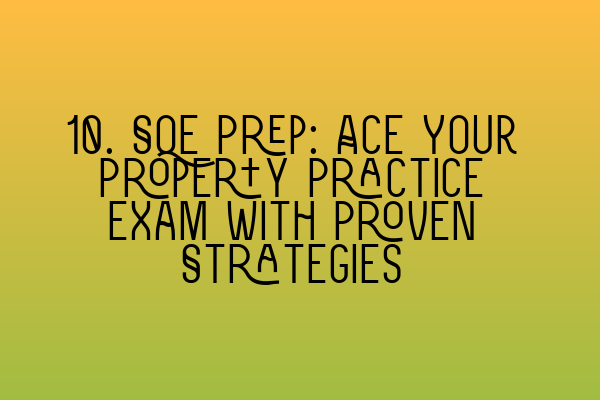SQE Prep: Ace Your Property Practice Exam with Proven Strategies
Preparing for the Solicitors Qualifying Examination (SQE) can be a daunting task, especially when it comes to the Property Practice exam. Property law is a complex area that requires a deep understanding of legal principles and practical application. However, with the right strategies and preparation, you can increase your chances of success. In this article, we will share 10 proven strategies to help you ace your Property Practice exam.
1. Understand the Exam Format
Before diving into the preparation, it is crucial to familiarize yourself with the exam format. The SQE Property Practice exam consists of both multiple-choice questions and written scenarios. It tests your knowledge of various property law topics, such as conveyancing, leases, mortgages, and landlord-tenant disputes. Understanding the exam format will enable you to tailor your study plan accordingly.
2. Review and Strengthen Your Foundation
To excel in the Property Practice exam, you need a solid foundation of property law knowledge. Start by revisiting the fundamentals of property law, including key statutes, cases, and legal principles. Consider enrolling in a comprehensive SQE 1 preparation course to refresh your knowledge and fill any gaps in your understanding. Our article on SQE 1 Preparation Courses can guide you in choosing the right course for you.
3. Practice, Practice, Practice
Practice is essential for success in any exam, especially for the Property Practice exam. Make use of practice questions and quizzes to test your knowledge and enhance your understanding of different scenarios. Our SQE 1 Practice Exam Questions resource can provide you with valuable practice materials to improve your performance.
4. Analyze Past Exam Papers
Reviewing past exam papers can give you insights into the types of questions and scenarios you may encounter in the Property Practice exam. Analyze the structure of the questions, the areas of law covered, and the way answers are expected to be presented. This will help you familiarize yourself with the examiners’ expectations and enable you to tailor your answers accordingly.
5. Develop a Systematic Approach
Property law problems require a systematic approach to analyze and solve them effectively. Develop a structured method of approaching different scenarios, breaking them down into relevant legal issues and applying the appropriate legal principles. Implementing a systematic approach will streamline your thought process and maximize your efficiency in answering questions during the exam.
6. Focus on Key Concepts and Case Law
While it is important to have an overall understanding of property law, focusing on key concepts and landmark case law can give you an edge in the Property Practice exam. Identify the key principles and cases that frequently appear in property law problems and make sure you are well-versed in them. Linking relevant case law to your answers will demonstrate a deeper understanding of the subject matter.
7. Stay Updated with Current Developments
Property law is not static, and it is essential to stay updated with current legal developments. Subscribe to reputable legal publications and online resources to stay informed about recent cases, legislative changes, and emerging trends in property law. By being up to date, you can impress examiners with your knowledge of the latest legal developments and demonstrate your commitment to staying current as a future property law practitioner.
8. Join Study Groups or Discuss with Peers
Collaboration and discussion can be invaluable in enhancing your understanding of property law. Join study groups or engage in discussions with your peers to exchange ideas, debate legal issues, and clarify any doubts. Explaining concepts to others can solidify your own understanding and reveal any gaps in your knowledge that need to be addressed.
9. Time Management is Key
Time management is crucial in an exam where you are given a limited amount of time to answer multiple questions and scenarios. Practice time management techniques during your preparation to ensure that you can complete all the questions within the allocated time. Our SQE 1 Practice Mocks FLK1 FLK2 resource can provide you with timed practice exams to help you improve your time management skills.
10. Seek Expert Guidance
Lastly, consider seeking expert guidance to enhance your preparation for the Property Practice exam. Enrolling in a specialized SQE 2 preparation course that focuses on property law can provide you with in-depth knowledge, practical insights, and personalized feedback. Our SQE 2 Preparation Courses article can assist you in finding a suitable course to further refine your skills.
In conclusion, excelling in the Property Practice exam requires a combination of thorough knowledge, effective preparation strategies, and diligent practice. By following these proven strategies and investing time and effort in your preparation, you can increase your chances of achieving success in the SQE Property Practice exam. Remember to stay focused, organized, and determined throughout your journey. Good luck!
For information on upcoming SQE exam dates, please refer to our article on SRA SQE Exam Dates.
